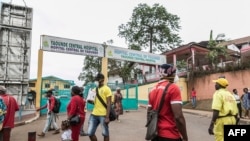Rosalie Dipoko, 43, a farmer and single mother of three children, says she has been prohibited from leaving the government’s Central Hospital in Cameroon’s capital, Yaounde, since March 25 because, like others in her situation, she can't pay her bill.
She was involved in a fatal road accident in Bafia on the outskirts of Yaounde in December 2020. One of her legs has been amputated. Dipoko says she is tired of what she calls the physical and mental torture of being held against her will because she lacks $1,000 to settle her hospital bill.
Dipoko says it is very unhealthy for a hospital to prohibit poor people who cannot pay bills from returning to their homes. She says people visit hospitals to find relief, not to be tortured psychologically for the simple reason that they are poor and cannot afford to settle hospital bills. She says guards forcefully stop hungry patients from going out of hospital gates to look for food and that poor patients bathe in open spaces in front of passers-by.
This week, Dipoko and scores of other patients and their family members held protests at government-run hospitals. They blame the government for not being able to take care of poor patients and called on officials to settle their bills and grant them freedom to return to their houses.
Some of the patients forced their way out of hospitals. Others prohibited incoming patients from accessing medical staff as part of their demonstration.
No arrests
Police said they protected civilians visiting hospitals for treatment and made no arrests.
National health officials said that following the demonstrations, some patients who couldn't pay for treatment were allowed to leave.
Manaouda Malachie, Cameroon’s health minister, visited the Central Hospital on Friday. He said he asked hospital officials to allow poor patients who cannot afford to pay bills after treatment to return to their homes — with exceptions. He said the health ministry would draw from its limited emergency budget to settle the unpaid bills.
Malachie said that if Cameroonians fail to pay hospital bills, claiming that they are poor, hospitals will not be able to offer treatment to the sick when they run short of funds to buy equipment and medication. He said well-to-do family members should, in solidarity, help sick relatives pay their bills.
Cameroon’s National Institute of Statistics said 80 percent of the central African state’s 25 million people do not have health insurance. When they fall sick, they rely on their savings, family members and well-wishers to settle hospital bills. A study by the institute indicated that in 2019, 70 percent of the country’s total health expenditure was borne by households.
Traditional healers used
Daniel Bekolke, spokesperson for the Cameroon Association for Equal Access to Treatment, said Cameroon needed to improve access to health care for the poor. He said 70 percent of Cameroonians preferred visiting African traditional healers for treatment because health care is very expensive at conventional hospitals.
He said hospital treatment was still out of reach for millions of poor Cameroonians despite government promises to reduce costs by giving subsidies to the poor. He said the government could not rely on families to settle hospital bills of their sick relatives because nothing compels relatives to help. He said only a well-developed health policy could help poor patients.
Cameroon’s health ministry said many patients visit hospitals only when their situations have become critical. Hospitals treat them with the hope of having bills settled after treatment. Some patients started escaping after treatment, and hospitals began prohibiting them from leaving until bills are settled.
Malachie said Cameroon since August 2020 has been providing its universal health coverage plan, which will make it possible for the poor to pay less for treatment.




